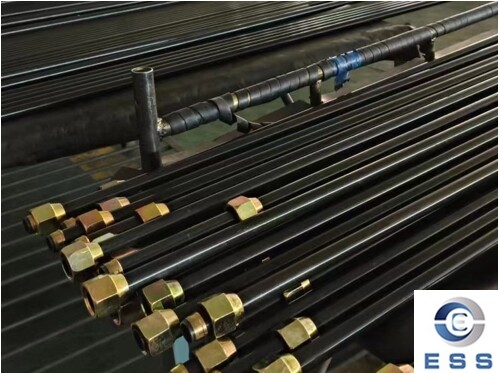
The pressure of seamless hydraulic
tubes is usually between 1000 and 8000 pounds per square inch (PSI). The
specific value depends on factors such as pipe specifications, materials, wall
thickness and use environment.
Seamless hydraulic tubes are an
indispensable part of hydraulic systems, and their ability to withstand
pressure directly affects the normal operation and safety of the system. So,
what is the pressure of hydraulic tubes? This is not a fixed value, but the
result of the influence of multiple factors.
Pressure level of hydraulic tubes
Hydraulic tubes used in hydraulic systems
need to withstand high-pressure impacts and precise fluid flow control, so the
material, wall thickness, outer diameter and other parameters of hydraulic
tubes need to be standardized. According to the different pressures of
hydraulic tubes, hydraulic tubes are generally divided into three pressure
levels: light (L), standard (S), and heavy (H).
1. Light hydraulic tubes
Light hydraulic tubes are suitable for
low-pressure hydraulic systems, and their pressure is generally 0-16Mpa.
2. Standard hydraulic tubes
Standard hydraulic tubes are suitable for
medium-pressure hydraulic systems, and their working pressure is generally
16-32Mpa.
3. Heavy-duty hydraulic tubes
Heavy-duty hydraulic tubes are suitable for
higher-pressure hydraulic systems, and their working pressure can be as high as
64Mpa or more.
Factors affecting the pressure-bearing
capacity of hydraulic tubes
1. Pipeline specifications
Seamless hydraulic tubes of different
specifications have differences in their ability to withstand pressure.
Generally speaking, the larger the pipe diameter and the thicker the wall
thickness, the stronger its ability to withstand pressure. The diameter of the
hydraulic tube is proportional to the working pressure, while the pipe length
is inversely proportional to the maximum working pressure and its stress.
2. Material selection
The material
of the seamless hydraulic tube has a decisive effect on its ability to
withstand pressure. Common materials such as carbon steel, stainless steel,
aluminum alloy, etc. each have different strengths and toughness, which affects
the pressure-bearing capacity of the pipe. The pipes and joints in the
hydraulic system also need to withstand instantaneous pressure shocks, so it is
necessary to select corrosion-resistant, wear-resistant, high-strength
water-bath heat-treated seamless
steel pipes.
3. Use environment
The use environment of the seamless
hydraulic tube will also affect its ability to withstand pressure. For example,
factors such as temperature, humidity, corrosive media, and vibration may
affect the pressure bearing capacity of the pipeline to varying degrees.
The operating speed of the hydraulic system
is also an important factor affecting the pressure of the hydraulic tube. If
the speed is too fast, the inertia of the liquid in the pipe will increase the
pressure fluctuation, resulting in pipe rupture.
The range of pressure that the hydraulic
tube can withstand
Taking the above factors into
consideration, the pressure range of seamless hydraulic tubes is usually
between 1000 and 8000 pounds per square inch (PSI). However, this does not mean
that all hydraulic tubes can work safely within this range. In fact, the
specific value needs to be determined based on the actual specifications,
materials, wall thickness, and use environment of the pipe.
How to choose the right hydraulic tube
In order to ensure the normal operation and
safety of the hydraulic system, it is very important to choose the right
hydraulic tube. In the selection process, factors such as pipe specifications,
materials, wall thickness, and use environment should be fully considered, and
choose suitable hydraulic
tubes in different pressure hydraulic systems to ensure that the selected
hydraulic tubes can withstand the working pressure required by the system.
Summary
In short, the pressure that seamless
hydraulic tubes can withstand is not a fixed value, but the result of the
combined influence of multiple factors. Understanding these influencing factors
is of great significance for the correct selection and use of hydraulic tubes,
which helps to ensure the stable operation and safety of the hydraulic system.













 Eastern Steel Manufacturing Co.,Ltd not only improve product production and sales services, but also provide additional value-added services. As long as you need, we can complete your specific needs together.
Eastern Steel Manufacturing Co.,Ltd not only improve product production and sales services, but also provide additional value-added services. As long as you need, we can complete your specific needs together.










